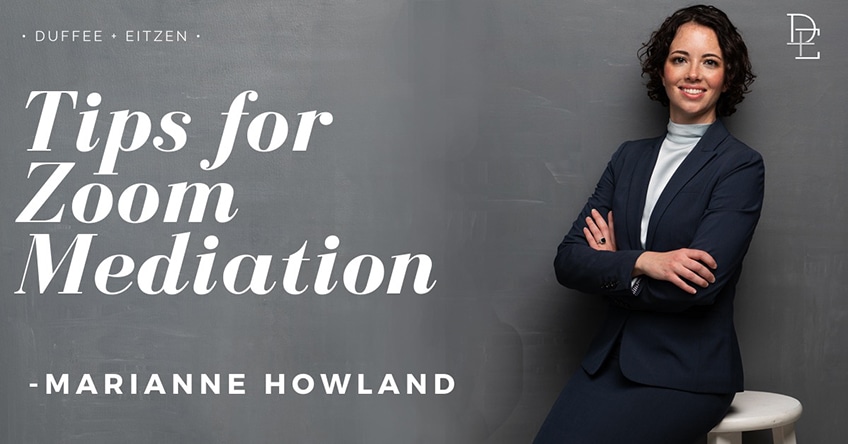Tips for Zoom Mediation by Marianne Howland

- Written by Duffee + Eitzen Administrator
- Categorised Divorce, General Tips
Mediation over zoom and other video chatting platforms has become the norm these days. While there are some definite benefits to mediating from the comfort of your home, there are drawbacks, as well.
One benefit is the ability to take your client “off the clock” when you and your client are not working on a counter-offer or communicating with the mediator. This gives you the ability to work on other cases and it gives your client the gift of time. Clients tend to be very appreciative of this.
The other side of this coin is one of the major drawbacks to zoom mediation. One of the reasons mediation is so effective is that, typically, no one leaves the mediator’s office until an agreement has been hammered out. The psychological effect this has on parties and attorneys cannot be overstated. When you have spent all day in an office working on terms and going back and forth with the other side, you are very invested in settling.
With zoom mediation, your client may not feel the same pressure to settle and go home. Your client is home. Your client may not feel as invested in settling as they would if they were in an unfamiliar setting all day without any of the normal distractions and comforts of home.
To avoid this pitfall, it is imperative that your client understands the ramifications of not settling and having to go to trial. During the times when you are not communicating with the mediator, you should speak to your client about the cost-benefit analysis of going to trial versus settling. You should also take that opportunity to discuss the emotional toll trial can take on the parties and the parties’ children, if applicable.
Another issue that comes up with zoom mediation is confidentiality. Some mediators will have you and your client set up on one computer in one room and the opposing party and counsel set up on a computer in another room. If this is the case, you and your client should not communicate over the zoom platform when the mediator has left the room. You should mute your video feed and communicate via phone. This guarantees that the other side and the mediator cannot overhear your confidential communications.
Something I have found helpful during zoom mediations is to have a template of settlement terms typed up and ready to go so that my client and I can fill in the specifics and share that document with the mediator as we continue to counter throughout the day. And, of course, a property division spreadsheet is imperative. These tools can help your client and the other side understand all of the moving parts. This is so helpful for your client in lieu of being in the same room and going over the paperwork together.
You should do a practice zoom session with your client so that you are both comfortable with zoom and its features. This is a good way to put your client at ease and prepare them for what to expect during mediation.
So far, zoom mediation has been successful for my clients and I appreciate our mediators’ ability to adapt and still serve our needs during this health crisis. I hope you and your clients have success with zoom mediation as well.
About the Author:
Marianne Howland, a partner at Duffee + Eitzen, has been practicing family law for over ten years. She graduated from Texas A&M University School of Law in 2006. Since graduating, she has handled cases ranging the entire spectrum of family law from adoptions, custody battles, pre and post-nuptial agreements, to divorces and post-divorce modifications and enforcement. She is very comfortable in the courtroom litigating her client’s case. However, she encourages clients to settle their issues amicably when possible. Prior to joining Duffee + Eitzen, she had her own law practice for 10 years.
She has two small children and has personally been through a divorce. She brings these experiences to every case and has compassion and knowledge that assists her in her representation of each of her clients. This experience allows her to give her clients the kind of attention and advocacy they deserve.


Contact Us